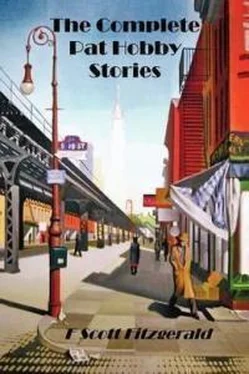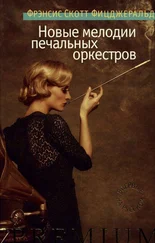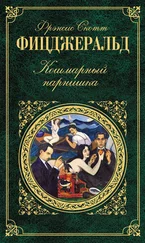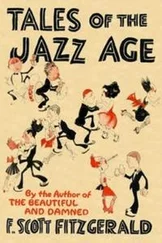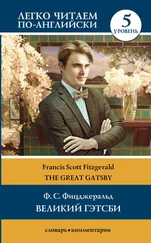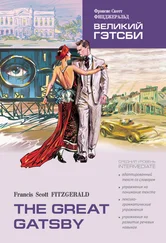"Is it an emergency?"
"I'll say."
"We'll have to split it up between several girls."
Pat continued to improve the script till the call boy arrived. He wanted to put in his war idea but time was short—still, he finally told the call boy to sit down, while he wrote laboriously in pencil on the last page.
CLOSE SHOT: Boris and Rita
Rita: What does anything matter now! I have enlisted as a trained nurse in the war.
Boris: (moved) War purifies and regenerates!
(He puts his arms around her in a wild embrace as the music soars way up and we FADE OUT)
Limp and exhausted by his effort he needed a drink, so he left the lot and slipped cautiously into the bar across from the studio where he ordered gin and water.
With the glow, he thought warm thoughts. He had done ALMOST what he had been hired to do—though his hand had accidentally fallen upon the dialogue rather than the structure. But how could Berners tell that the structure wasn't Pat's? Katherine Hodge would say nothing, for fear of implicating herself. They were all guilty but guiltiest of all was René Wilcox for refusing to play the game. Always, according to his lights, Pat had played the game.
He had another drink, bought breath tablets and for awhile amused himself at the nickel machine in the drugstore. Louie, the studio bookie, asked if he was interested in wagers on a bigger scale.
"Not today, Louie."
"What are they paying you, Pat?"
"Thousand a week."
"Not so bad."
"Oh, a lot of us old–timers are coming back," Pat prophesied. "In silent days was where you got real training—with directors shooting off the cuff and needing a gag in a split second. Now it's a sis job. They got English teachers working in pictures! What do they know?"
"How about a little something on 'Quaker Girl'?"
"No," said Pat. "This afternoon I got an important angle to work on. I don't want to worry about horses."
At three–fifteen he returned to his office to find two copies of his script in bright new covers.
BALLET SHOES
from René Wilcox and Pat Hobby First Revise
It reassured him to see his name in type. As he waited in Jack Berners' anteroom he almost wished he had reversed the names. With the right director this might be another It Happened One Night, and if he got his name on something like that it meant a three or four year gravy ride. But this time he'd save his money—go to Santa Anita only once a week—get himself a girl along the type of Katherine Hodge, who wouldn't expect a mansion in Beverly Hills.
Berners' secretary interrupted his reverie, telling him to go in. As he entered he saw with gratification that a copy of the new script lay on Berners' desk.
"Did you ever—" asked Berners suddenly "—go to a psychoanalyst?"
"No," admitted Pat. "But I suppose I could get up on it. Is it a new assignment?"
"Not exactly. It's just that I think you've lost your grip. Even larceny requires a certain cunning. I've just talked to Wilcox on the phone."
"Wilcox must be nuts," said Pat, aggressively. "I didn't steal anything from him. His name's on it, isn't it? Two weeks ago I laid out all his structure—every scene. I even wrote one whole scene—at the end about the war."
"Oh yes, the war," said Berners as if he was thinking of something else.
"But if you like Wilcox's ending better—"
"Yes, I like his ending better. I never saw a man pick up this work so fast." He paused. "Pat, you've told the truth just once since you came in this room—that you didn't steal anything from Wilcox."
"I certainly did not. I GAVE him stuff."
But a certain dreariness, a grey malaise, crept over him as Berners continued:
"I told you we had three scripts. You used an old one we discarded a year ago. Wilcox was in when your secretary arrived, and he sent one of them to you. Clever, eh?"
Pat was speechless.
"You see, he and that girl like each other. Seems she typed a play for him this summer."
"They like each other," said Pat incredulously. "Why, he—"
"Hold it, Pat. You've had trouble enough today."
"He's responsible," Pat cried. "He wouldn't collaborate—and all the time—"
"—he was writing a swell script. And he can write his own ticket if we can persuade him to stay here and do another."
Pat could stand no more. He stood up.
"Anyhow thank you, Jack," he faltered. "Call my agent if anything turns up." Then he bolted suddenly and surprisingly for the door.
Jack Berners signaled on the Dictograph for the President's office.
"Get a chance to read it?" he asked in a tone of eagerness.
"It's swell. Better than you said. Wilcox is with me now."
"Have you signed him up?"
"I'm going to. Seems he wants to work with Hobby. Here, you talk to him."
Wilcox's rather high voice came over the wire.
"Must have Mike Hobby," he said. "Grateful to him. Had a quarrel with a certain young lady just before he came, but today Hobby brought us together. Besides I want to write a play about him. So give him to me—you fellows don't want him any more."
Berners picked up his secretary's phone.
"Go after Pat Hobby. He's probably in the bar across the street. We're putting him on salary again but we'll be sorry." He switched off, switched on again. "Oh! Take him his hat. He forgot his hat."
Pat Hobby and Orson Welles
Esquire (May 1940)
'Who's this Welles?' Pat asked of Louie, the studio bookie. 'Every time I pick up a paper they got about this Welles.'
'You know, he's that beard,' explained Louie.
'Sure, I know he's that beard, you couldn't miss that. But what credits's he got? What's he done to draw one hundred and fifty grand a picture?'
What indeed? Had he, like Pat, been in Hollywood over twenty years? Did he have credits that would knock your eye out, extending up to—well, up to five years ago when Pat's credits had begun to be few and far between?
'Listen—they don't last long,' said Louie consolingly, 'We've seen 'em come and we've seen 'em go. Hey, Pat?'
Yes—but meanwhile those who had toiled in the vineyard through the heat of the day were lucky to get a few weeks at three–fifty. Men who had once had wives and Filipinos and swimming pools.
'Maybe it's the beard,' said Louie. 'Maybe you and I should grow a beard. My father had a beard but it never got him off Grand Street.'
The gift of hope had remained with Pat through his misfortunes—and the valuable alloy of his hope was proximity. Above all things one must stick around, one must be there when the glazed, tired mind of the producer grappled with the question 'Who?' So presently Pat wandered out of the drug–store, and crossed the street to the lot that was home.
As he passed through the side entrance an unfamiliar studio policeman stood in his way.
'Everybody in the front entrance now.'
'I'm Hobby, the writer,' Pat said.
The Cossack was unimpressed.
'Got your card?'
'I'm between pictures. But I've got an engagement with Jack Berners.'
'Front gate.'
As he turned away Pat thought savagely: 'Lousy Keystone Cop!' In his mind he shot it out with him. Plunk! the stomach. Plunk! plunk! plunk!
At the main entrance, too, there was a new face.
'Where's Ike?' Pat demanded.
'Ike's gone.'
'Well, it's all right, I'm Pat Hobby. Ike always passes me.'
'That's why he's gone,' said the guardian blandly. 'Who's your business with?'
Pat hesitated. He hated to disturb a producer.
'Call Jack Berners' office,' he said. 'Just speak to his secretary.'
After a minute the man turned from the phone.
'What about?' he said.
'About a picture.'
He waited for an answer.
'She wants to know what picture?'
Читать дальше
